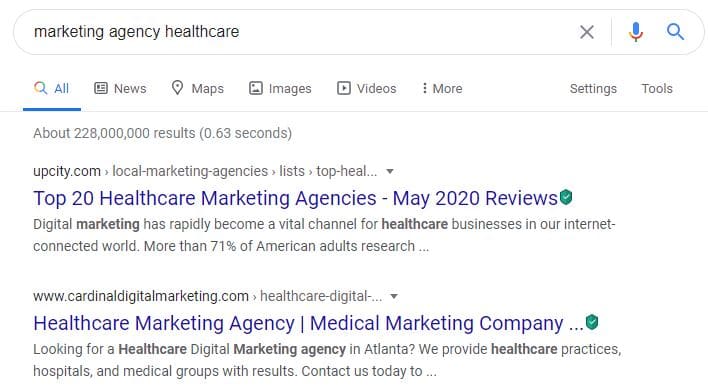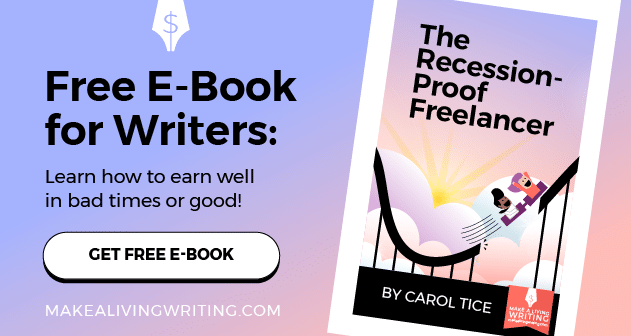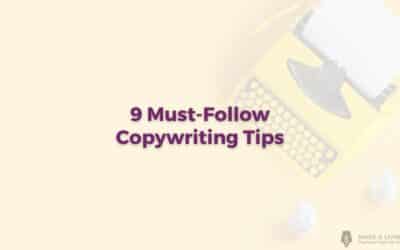Wondering how to land some agency work as a freelance writer?
No, not the kind of “agency work” someone posts on Upwork. That’s almost always the path to low rates, soul-sucking work, and burnout.
Legit digital marketing agencies work with freelancers all the time. And there’s lots of them.
- Agencies that work with a broad range of clients in different industries, and…
- Agencies that specialize in specific niches like technology, healthcare, or financial services.
Google it: marketing agency + (your niche)

If you’re not sure chasing agency work is worth your time, consider this…
Right now, companies spend an estimated $400 billion a year on content marketing, according to industry data.
Here’s how it works: Companies hire digital marketing agencies to do the work. And those agencies hire freelancers to do things like:
- Blog posts
- Case studies
- Annual reports
- White paper writing
- Website content
- Lead magnets
- Video scripts
- Press releases, and more
Starting to get the picture? Agency work can be a great way to make money as a freelance writer, and have steady work.
So how do you get a slice of agency work? We asked two digital marketing agency pros to show you the ropes. Here’s what you need to know:
Meet marketing agency pros Annie Zelm and Ryan Malone

Annie Zelm
Annie Zelm is an award-winning business journalist and content marketing expert.
She wrote for the Sandusky Register in Ohio as a reporter. And then transitioned to public relations and content marketing.
For the past six years, she’s worked at Kuno Creative as a brand journalist and content department manager.

Ryan Malone
Ryan Malone is the founder of SmartBug Media. It’s a digital marketing agency based in Irvine, Calif. Malone worked in digital marketing for almost a decade before launching SmartBug Media.
He’s grown the company with an entirely remote workforce, and helps a long list of clients in healthcare, technology, manufacturing, and other businesses generate leads, drive traffic, and build brand authority with digital marketing.
1. What kind of content projects do you hire freelancers for?
Annie: It’s typically blogging work. We have a lot of clients that want 4 to 8 blog posts a month. We have an entire team of writers on staff. But sometimes we’ll hire freelancers for a bigger content piece like e-books,
Ryan: A lot of article writing and long-form things. There’s direct-response work for lead-nurturing emails and landing-page copy. We do a lot of infographic research and copy, and some writers are really skilled at that. We also assign some byline-article work and PR-writing to freelancers.
2. What do you give freelancers to complete an assignment?
Annie: We really spell out the strategy for a blog post when we give a writer an assignment. It includes information about keywords, the target audience, general topic, resources to use, and what the call to action is. We try to make sure this is really focused, so our freelancers don’t have to guess.
Ryan: We give our writers a very detailed brief with information about the client. Sometimes, we’ll have writers join us on client calls. Or we’ll send them an interview recording. For other assignments, we might provide a detailed outline and some key points we want the writer to include.
3. How do you assign projects to freelance writers?
Annie: We usually work from a spreadsheet of freelancers that we’ve worked with before, or freelancers that have contacted us. When we have assignments to fill, we refer back to that and go: “OK., what does my workload look like? What do I need to outsource to freelancers?”
Ryan: If we think there’s a good chance we want to work with a freelancer, we’ll ask you to write a test article first. It’s a paid test article, so we don’t do the cheesy game of looking for free work from people. Based on how you do, we go from there.
4. HubSpot certified: Yes or no?
Annie: That’s hugely beneficial. As a freelancer, I think that’s a gold star that sets you apart. Use the free training tools, do the tutorials, watch videos, and use the resources on HubSpot.com. Subscribe to the blog. Of course, the Kuno Creative blog is a good one to learn about inbound marketing, too.
Ryan: HubSpot can give you a solid primer on how and why inbound marketing works. But simply having that certification doesn’t necessarily mean that people have digested it. What’s more important that a certification is being able to show up in an interview and explain the concepts that make digital marketing work.
5. How do you determine rates for freelance work?
Annie: There’s usually room to negotiate. Obviously we have kind of a top level of what we can pay. But we look at things like the size of the client, complexity of the blog post or assignment, and subject matter.
Pretty common to figure out an agreeable rate with something like:
Q: “Here’s what we estimate the word count will be. What would you charge for a post like this?”
Ryan: We have a similar process. So there’s room to negotiate. We have a range to work with, and usually start by finding out what your normal rate is for the type of assignment we’ve got. If your rate is out of range, we’ll try to figure out if we can come to some kind of an agreement.
But again, one of our goals is to have a long-term relationship with writers. Grinding somebody for a dollar or two when you know they’re talented and trying to make a living, isn’t a best practice. It’s better to negotiate, pay fair rates, so everybody starts off on a great foot.
6. What do you want to know from a freelance writer who contacts you?
Annie: It’s really helpful to know what industries you’ve written for and what types of topics you’ve covered. That helps us determine if you’re a good fit for one of our clients. Be specific. Give us some details about your experience when you initially just reach out.
Ryan: We have an application process for freelance writers on our site. But I think the things that stand out the most are your writing quality, your personality, and what you know about how digital marketing or inbound marketing works.
7. What experience do you look for in freelance writers?
Annie: It’s really a case-by-case basis. It really just depends. But we do like to see that you’ve had business-writing experience. You know, it’s a lot different than writing a personal blog post or even writing newspaper articles. We also want to work with writers who have an understanding of how business writing and marketing works, keywords, SEO, and the objectives of a blog post.
Ryan: There’s a lot that goes into that. We position ourselves as an extension of our client’s team. And we look at freelancers as an extension of our team. Sometimes we get our freelancers involved on client calls. We like to get them involved in idea generation, and give them a lot of flexibility in terms of creating a compelling story for the client.
Accountability and deadlines are huge. Sometimes we need a writer with specific experience or expertise to match up with our clients. And we look for people who are just fun to work with.
Bonus question: Where does the name SmartBug come from?
Ryan: SmartBug is actually named after my dog, Lola. We call her “The Bug,” because she has big bug eyes. I don’t tell that story all that much because a 6-foot-3-inch tall guy naming his company after a 12-lb Pekingese doesn’t always come out right. But, such is life. She’s a cool little dog.
Go get some agency work
When a digital marketing agency needs a freelance writer, they’ll usually start with their existing network of writers or ask for referrals. Many don’t actively post job listings or recruit writers. But client managers and content directors are always on the lookout for talented writers to help their clients shine. Reach out. Send an email. Introduce yourself. That’s how it’s done.
Have you landed agency work as a freelancer? Let’s discuss in the comments below.
Evan Jensen is the blog editor for Make a Living Writing. When he’s not on a writing deadline or catching up on emails, he’s training to run another 100-mile ultra-marathon.










